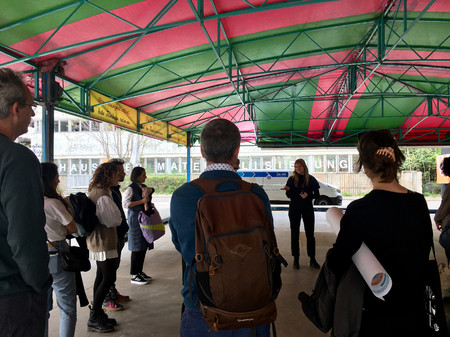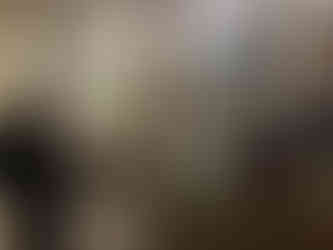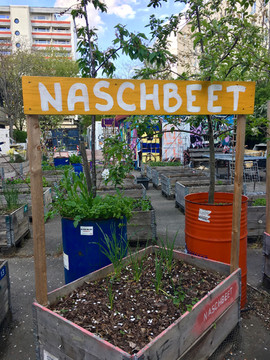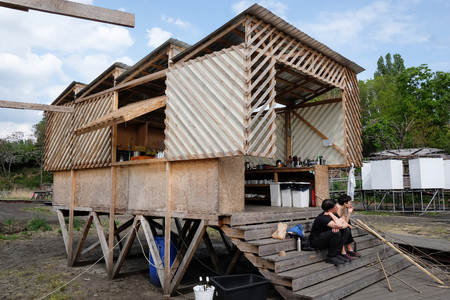Rad news! Rad people, rad spaces.
- Amy Scaife
- May 16, 2022
- 6 min read
Updated: May 17, 2022
A generous gathering in Berlin to meet fellow 'experimenters' taking part in the UrbanCommunity project - 'City Makers for Sustainable and Just Cities: From Theory to Action'. (& reminders of the beauty of rad spaces)

In early March while holed up in bed with covid, I applied to participate in a funded, peer-to-peer series of 'experiments' across Europe. UrbanA - also known as UrbanCommunity, were looking for urban sustainability projects with justice at their heart. Much to my amazement and joy, hubRen was chosen to be one of the 9 'experiments' to be offered funding and support. Cheers, fever-fugue writing state!
The experiment I proposed was to take the bike on a tour of Waltham Forest, visiting places and communities that might not usually get reached by sustainability oriented projects. The plan is to partner with some of the many amazing local groups and initiatives, as a process of weaving and amplification of local stories, knowledge and and action. Not only is the funding deeply appreciated, being invited into a community of practitioners, both established and emerging, to share with and learn from each other is just so exciting, inspiring and uplifting. Along with this is the simple validation of, 'yay people believing in my odd little project!'. Many thanks to ICLEI and Robert Bosch Stiftung for the support.

The experimenters were invited to a 1.5 day workshop in Berlin, so we could meet each other, introduce our projects, explore our shared values and begin to define our community of practice. I have not left the UK since August 2019, and have barely left Walthamstow in that time, much less ON MY OWN.
Needless to say, excitement levels were high! Not even a 4+ hour delay to my 10 hour train journey could dent it, especially once I discovered the restaurant car. I deeply appreciate living in Europe and being able to access so much of it by rail. It's just so frustrating how much more expensive it is compared to flying. My train tickets were around 10x the price of flying. It really should be the other way around, the most damaging and unjust mode of transport should be the most expensive.
A little bit travel worn and in need of strong tea (apologies to Sofia!), I made it to the gathering space, to be immediately revived and energised by the spirit, creativity and big-heartedness of both the fellow experimenters and the co-ordinators guiding the process. The experiments ranged from a community food redistribution project in Greece, a DIY anarchist reclaiming of wasteland in Hungary, establishing gardens and community space amongst abandoned old city walls in Italy, developing new models of community co-creation in Istanbul and Lisbon, also in Lisbon, an abandoned apartment being turned into a community asset, and more, all dreamed up and coaxed into being by courageous, earth and community lovers and creators. I very much loved hearing Anna tell us the story of how a group of young teens burnt down a building and cellar in their community garden, instead of responding defensively, they reached out to the boys and invited them to come and build their own space within the garden. The teens took them up on the offer and are now active and respected assets to the community and garden space. After a day spent chewing over ideas of justice, civic society and change, we walked to the Haus Der Statistik for an incredible tour of this vast architectural relic of East German bureaucracy, semi-abandoned by the state, brought into community use through direct action, and now part of an ongoing community and city discussion about the future.
The scale of the place was just incredible, sprawling over 50,000 sq/m! To deter squatters, the city removed the windows of the floors above ground level, turning it into Berlin's largest pigeon coop. Along with pigeons were rare migratory birds, so abundant birdhouses went up too. The ground floors were taken over by the community, transformed into an evolving collection of rad spaces such as a materials workshop, a Library of Things, a cinema, a Ukrainian Welcome centre, a rollerskating rink, a community garden and a safe refuge and gathering space for young houseless folk.
Now the plan is to redevelop the site with a mix of housing, government admin and commercial offices, along with abundant space for the current and future community projects. The structure of the main, original office blocks will also be re-used and re-fitted. It's been a long and hard fought for project, the collective of Haus Der Statistik and the wider community digging in and not backing down, fighting for their space, vision and inclusion. It is an inspiring vision of what is possible when the city, community and commercial interests work together to realise something far bigger and richer than just the maximisation of profit.

After the workshop I was lucky to be able to enjoy three days exploring Berlin, zipping across and around the city on the incredible bike and active travel network. As much as I enjoy travelling with family and friends, I very much appreciated the luxury of waking up and setting off on my personal itinerary without negotiation, compromise or the hauling of extra kid ephemera. It became possible to do not one but TWO exhibitions in a day, followed by a leisurely wander around a flea market with a cold beer in hand. The Easy Rider Road Show was pure joy and inspiration (omg the drone bike!), an exhibition within an exhibition about radical bike culture around the world, mounted on the back of adapted cargo bikes.
There definitely seemed to be far more radical spaces visible and accessible in Berlin than in London (or should I say in London's present form). It was wonderful, though bittersweet, to visit The Floating University, an incredible 'NatureCulture learning site, an Urban practice on and in the rainwater retention pool of former Berlin Tempelhof airport since 2018.'
While there I listened to a moving talk about biologically sensitive cohabitation, culture change and biomimicry, the ideals the Floating University are.. floated upon. Sadly, the collision of 19th century bureaucracy with 20th century infrastructure and the multi-crises of the 21st century is currently resulting in regressive policy and planning choices that casts the future of the Floating University in doubt, along with driving the once alive basin towards a far more depleted, dried out biological state. It's very sad and I hope to hear better news in the near future.
Despite this example of the limits of excessive bureaucracy, something that struck me about Berlin was a perceptible general attitude of maturity, trust and social responsibility. This was most evident during my visit to the gorgeous Gemeinschaftsgarten Allmende-Kontor, a community garden on the eastern edge of Tempelhofer Feld.
No fences, no rigid grids of ownership. Instead it was an organic maze of pathways, DIY planters and unique structures, hidden shady clearings, a warren of peace and activity with children playing in mud, watering, people reading, weeding, playing instruments or just soaking in the atmosphere. No fences. No locked gate to 'protect' this beautiful space from the public, it is an open, commonly held good.
Fences, borders and barriers, put up as 'protection', end up maintaining and perpetuating ideas of 'us' v 'them'. Research has shown that people inside a car, 'protected' in their glass and metal boxes, display less empathy towards people outside the car. Borders, practically non-existent to extreme wealth, keep the human victims of extractivist capitalism far away from the perpetrators of the violence against their bodies and land. I wonder about the recent, lived, collective memory of the Berlin Wall and its fall, how that would affect attitudes towards barriers and fences, of us and them, community and care.

While many of Berlin's famous squats have been lost to evictions and developers, there are still pockets of creative and radical visions of other ways of being to be discovered and stumbled upon. I was so reminded how important these spaces are for our imagination. The neat, clean, safe, and insurance compliant architecture of government and commercial interests can be stultifying. We need weird spaces to help us imagine our way out of the cold, bland limits of the commercial, capitalist, 'growth at all costs' mindset. It was a reminder that I mustn't be afraid to let the bike revel in its weirdness.
I packed as much as I could in my three free days, and only just scratched a tiny corner of the surface of Berlin. I can't wait to return, apparently a sleeper train is starting up next year from Paris! As much as I enjoyed the freedom of solo-exploration, it's clearly also a brilliant place for families and I can't wait to bring Juno and Ian back to explore more together. So excited about the journey I will be taking with my new UrbanCommunity crew, and deeply grateful for the opportunity to explore beautiful Berlin and her creative, rad, community minded spaces.





































Why I Don’t Date Liars, No Matter How Fit They Are
The Airport Bar
Knowing When to Stay Just Friends
Single Supplements = Unmarried Inequality
20 years later…
Tinder & the Empress Nympho
Social Grace
Integrated Fundraising = Integrated Dating